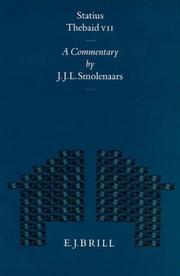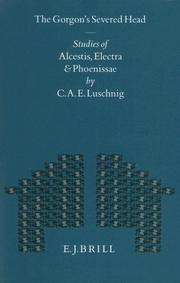| Listing 1 - 2 of 2 |
Sort by
|

ISBN: 9004100296 9004329390 9789004100299 Year: 1994 Volume: 134 Publisher: Leiden Brill
Abstract | Keywords | Export | Availability | Bookmark
 Loading...
Loading...Choose an application
- Reference Manager
- EndNote
- RefWorks (Direct export to RefWorks)
The epic poem the Thebaid by P. Papinius Statius, written about AD 80 to 92, deals with the fraternal strife between Oedipus' sons Eteocles and Polynices for the mastery of Thebes. Book VII describes the forced march of the Seven and their arrival at Thebes, Jocasta's vain attempt at mediation and Amphiaraus' spectacular katabasis . This book is the first which deals with Thebaid VII since Barth (1664) and Amar andamp; Lemaire (1825-30). Apart from being a commentary in the philological sense, it examines in close detail the poet's mannered style and analyses the text as a system of intertextual references. In addition to Homer and Vergil, specific passages from Euripides, Lucan, Seneca and especially Valerius Flaccus were exploited by Statius to create his challenging imitation. The identification of these sources offers the key to interpret and evaluate the poet's artistic intentions. The Introduction discusses Statius' technique of multiple imitation. The information brought together has been made easily accessible by full indexes and an appendix listing the passages imitated by Statius.
Statius, Publius Papinius --- Ancient rhetoric --- Antieke retoriek --- Retoriek [Antieke ] --- Retoriek van de Oudheid --- Rhetoric [Ancient ] --- Rhétorique ancienne --- Rhétorique de l'Antiquité --- Sept [Les ] contre Thèbes (Mythologie grecque) dans la littérature --- Seven against Thebes (Greek mythology) in literature --- Zeven [De ] tegen Thebe (Griekse mythologie) in de literatuur --- Epic poetry, Latin --- Rhetoric, Ancient --- Sept contre Thèbes (Mythologie grecque) dans la littérature --- Poésie épique latine --- History and criticism --- Histoire et critique --- Statius, P. Papinius --- Virgil --- Virgil. --- Influence. --- Seven against Thebes (Greek mythology) in literature. --- Sibling rivalry in literature. --- Polyneices (Greek mythology) --- Eteocles (Greek mythology) --- Rhetoric, Ancient. --- History and criticism. --- -Rhetoric, Ancient --- 870 --- 870.9001 --- Classical languages --- Greek language --- Greek rhetoric --- Latin language --- Latin rhetoric --- Latin epic poetry --- Latin poetry --- Literature Latin --- Literature Latin ( - 500) --- Rhetoric --- -Virgil --- Virgilio Marone, P. --- Vergilius Maro, Publius --- Vergilīĭ --- Virgile --- Vergílio --- Wergiliusz --- Vergilīĭ Maron, P. --- Vergilīĭ Maron, Publīĭ --- Verhiliĭ Maron, P. --- Vergil --- Virgilio --- Virgilīĭ --- Virgilius Maro, P. --- Virgilius Maro, Publius --- Virgil Maro, P. --- ווירגיל --- וירגיליוס --- ורגיליוס --- מרו, פובליוס ורגיליוס --- فرجيل --- Pseudo-Virgil --- Pseudo Virgilio --- Virgilio Marón, Publio --- Bhārjila --- Influence --- Thebes (Greece) --- In literature. --- Publius Papinius Statius --- Statius, Papinius --- Stace --- Virgilio Marone, P., --- Vergilīĭ, --- Virgile, --- Vergílio, --- Wergiliusz, --- Vergilīĭ Maron, Publīĭ, --- Verhiliĭ Maron, P., --- Vergil, --- Virgilio, --- Virgilīĭ, --- Virgilius Maro, P., --- Virgilius Maro, Publius, --- Virgil Maro, P., --- ווירגיל, --- וירגיליוס, --- ורגיליוס, --- מרו, פובליוס ורגיליוס, --- فرجيل, --- Pseudo-Virgil, --- Pseudo Virgilio, --- Virgilio Marón, Publio, --- Bhārjila, --- Eteocles (Greek mythology). --- Polyneices (Greek mythology). --- Virgilio Máron, Publio --- Vergili Maronis, Publius --- Sept contre Thèbes (Mythologie grecque) dans la littérature --- Poésie épique latine --- Rhétorique ancienne --- Sibling rivalry in literature --- Thēvai (Greece) --- Thívai (Greece) --- Thebes (Greece : Ancient city) --- Thiva (Greece) --- Thēva (Greece) --- Tebe (Greece) --- Theben (Greece) --- Thebes (Greece : Extinct city) --- Θῆβαι (Greece) --- Thēbai (Greece) --- Θήβα (Greece) --- Epic poetry [Latin ] --- Statius, P. Papinius - (Publius Papinius). - Thebais. - Liber 7. --- Vergilius Maro, P. --- Vergilius --- Marone, Publio Virgilio --- Epic poetry, Latin - History and criticism.

ISBN: 9004103821 900432979X 9789004103825 9789004329799 Year: 1995 Volume: 153 Publisher: Leiden Brill
Abstract | Keywords | Export | Availability | Bookmark
 Loading...
Loading...Choose an application
- Reference Manager
- EndNote
- RefWorks (Direct export to RefWorks)
The Gorgon's Severed Head looks at three plays of Euripides, one early, one middle and one late in his career. Innovations in genre, in the use of the traditional stories, in the representation of women and of gender issues are present at every period. In all three plays characters are depicted creating themselves and each other. Chapter One on Alcestis looks at the artistry of the two main characters and is especially concerned with finding a role for Admetus, the play's most serious problem. The second chapter treats the physical displacement of the myth in Euripides' version of the Electra-Orestes story. A last section approaches the layers of time and space in Phoenissae .
Classical Greek literature --- Drama --- Alceste (mythologie grecque) dans la littérature --- Alcestis (Greek mythology) in literature --- Alcestis (Griekse mythologie) in de literatuur --- Electra (Greek mythology) in literature --- Electra (Griekse mythologie) in de literatuur --- Electre (Mythologie grecque) dans la litérature --- Sept [Les ] contre Thèbes (Mythologie grecque) dans la littérature --- Seven against Thebes (Greek mythology) in literature --- Tragedie --- Tragedy --- Tragédie --- Treurspel --- Zeven [De ] tegen Thebe (Griekse mythologie) in de literatuur --- Alcestis (Greek mythology) --- Electra (Greek mythology) --- Seven against Thebes (Greek mythology) --- Women and literature --- Greek drama (Tragedy) --- Alceste (Mythologie grecque) --- Electre (Mythologie grecque) --- Sept contre Thèbes (Mythologie grecque) --- Femmes et littérature --- Tragédie grecque --- History and criticism --- Théâtre --- Histoire et critique --- Euripides --- Euripides. --- Criticism and interpretation. --- Alcestis (Greek mythology) in literature. --- Electra (Greek mythology) in literature. --- Seven against Thebes (Greek mythology) in literature. --- Tragedy. --- -Literature --- -Criticism and interpretation --- -Euripides --- Euripide --- Criticism and interpretation --- -Drama --- Literature --- Sept contre Thèbes (Mythologie grecque) --- Femmes et littérature --- Tragédie grecque --- Théâtre --- Ėvripid --- Yūrībīdīs --- Euripedes --- Eŭripido --- Eurypides --- Euripidesu --- אוריפידס --- エウリーピデース --- Εὐριπίδης --- Greece --- Euripides. - Alcestis. --- Alcestis, --- Electra --- Literature. --- Women and literature. --- Belles-lettres --- Western literature (Western countries) --- World literature --- Philology --- Authors --- Authorship --- Alceste, --- Alcestes, --- Alcesti , --- Alcestis --- Alkestidė, --- Alkēstis, --- Alkesto, --- Alkésztisz, --- Électre --- Alektra --- Ēlektra --- Elektro --- Elettra --- 厄勒克特拉 --- エーレクトラー --- אלקטרה --- 엘렉트라 --- Електра --- Электра --- الکترا --- اليكترا --- Ἀλέκτρα --- Ἠλέκτρα --- 阿尔克斯提斯, --- Алкеста, --- Алкестида, --- アルケースティス, --- 알케스티스, --- Ἄλκηστις, --- In literature. --- Alcestis (Euripides) --- Electra (Euripides) --- Phoenician women (Euripides) --- Phoenissae (Euripides) --- Phoinissai (Euripides) --- Euripidis Phoenissae (Euripides) --- Euripidou Phoinissai (Euripides) --- Euripidou Ēlektra (Euripides) --- Ēlektra (Euripides) --- Euripidis Electra (Euripides) --- Euripides' Electra (Euripides) --- Alcesti (Euripides) --- Euripides' Alcestis (Euripides) --- Alkēstis (Euripides) --- Greece. --- al-Yūnān --- Ancient Greece --- Ellada --- Ellas --- Ellēnikē Dēmokratia --- Elliniki Dimokratia --- Grčija --- Grèce --- Grecia --- Gret͡sii͡ --- Griechenland --- Hellada --- Hellas --- Hellenic Republic --- Hellēnikē Dēmokratia --- Kingdom of Greece --- République hellénique --- Royaume de Grèce --- Vasileion tēs Hellados --- Xila --- Yaṿan --- Yūnān --- Women and literature - Greece.
| Listing 1 - 2 of 2 |
Sort by
|

 Search
Search Feedback
Feedback About UniCat
About UniCat  Help
Help News
News